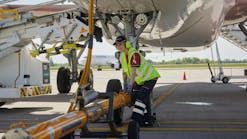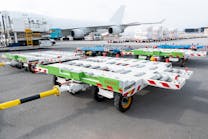The air cargo industry stands at a critical juncture in 2025, grappling with unprecedented
challenges while embracing transformative innovations. Labor shortages, capacity constraints, geopolitical tensions, and sustainability imperatives are reshaping operational strategies, while technological advancements in automation, artificial intelligence (AI), and digitalization are redefining efficiency and resilience.
This comprehensive analysis synthesizes findings from industry reports, case studies, and regulatory frameworks to provide actionable insights for stakeholders navigating this complex environment. Key themes include the urgent need for workforce upskilling, infrastructure modernization, and the integration of sustainable practices to meet evolving e-commerce demands and regulatory standards.
Labor shortages and workforce dynamics
Labor shortages remain among the most pressing challenges for air cargo operators in 2025. The scarcity of skilled personnel - exacerbated by immigration restrictions and outdated hiring practices - has led to operational delays, increased overtime costs, and heightened safety risks.
Inadequate staffing at cargo terminals has extended shipment wait times, directly impacting customer satisfaction and supply chain reliability. Overburdened employees face declining morale, creating a cyclical problem of burnout and attrition that further strains productivity.
Leading organizations are implementing reskilling programs that combine technical training with soft-skills development to address these gaps. Microlearning modules and immersive technologies like virtual reality (VR) are being deployed to simulate real-world scenarios, enabling workers to master equipment handling and safety protocols without disrupting operations.
Some airlines have adopted AI-driven predictive analytics to identify skill gaps and tailor training programs, resulting in improvements to operational efficiency. Partnerships with academic institutions complement these initiatives to create pipelines for talent in logistics management and aviation engineering.
Capacity constraints and infrastructure modernization
Air cargo terminals worldwide are operating at or near capacity, struggling to accommodate the surge in e-commerce-driven shipment volumes. At some major hubs, legacy infrastructure has led to bottlenecks in cargo processing, with average handling times increasing by more than 20% since 2023, in some cases.
Operators are investing in automated storage and retrieval systems (ASRS) and AI-led sorting technologies. Deployment of caster decking and IoT-enabled smart containers are significantly reducing cargo processing times while minimizing human error.
Modernizing infrastructure extends beyond terminal upgrades. Airports increasingly integrate with road and rail networks to create seamless multi-modal logistics corridors. The Port of Oakland's Phase 2 expansion project, for example, which includes electrified cargo loaders and automated guided vehicles (AGVs), has enhanced connectivity between air, land, and warehouse operations.
However, such projects require significant capital, posing financial challenges for operators already contending with inflationary pressures.
Geopolitical tensions and supply chain resilience
Geopolitical shifts, particularly U.S.-China trade disputes and regional conflicts, have forced air cargo operators to reconfigure supply chains. Alterations in global air freight routes due to tariff uncertainties and sanctions have increased average transit times.
Forward-thinking companies are adopting agile logistics models, in some cases leveraging blockchain for real-time shipment tracking and diversifying supplier networks across Southeast Asia and Eastern Europe, reducing geopolitical risk exposure.
New trade policies, such as eliminating duty-free exemptions for low-value shipments, have complicated customs processes. Air cargo operators must now submit digital manifests 12 hours before departure, necessitating upgrades to compliance management systems.
Collaborative platforms like IATAʼs ONE Source have standardized documentation across 150 countries, reducing clearance delays. Mid-sized carriers' compliance
costs remain high, however, averaging $4.3 million annually.
Technological transformation and operational efficiency
AI is revolutionizing air cargo operations through applications in route optimization, predictive maintenance, and demand forecasting, enabling reduced fuel consumption through analysis of real-time weather data and optimized flight paths.
Similarly, predictive maintenance algorithms serve to decrease equipment downtime while extending the lifespan of critical assets like aircraft tugs and conveyor systems.
The shift from paper-based processes to digital platforms has accelerated, with most cargo handlers now using IoT sensors for real-time tracking. Blockchain technology ensures data
transparency across supply chains, enabling stakeholders to monitor environmental conditions (e.g., temperature, humidity) for sensitive shipments like pharmaceuticals.
Sustainability imperatives and regulatory pressures
Sustainability has transitioned from a voluntary initiative to a regulatory mandate. The
International Air Transport Association (IATA) mandates a 5% SAF blend for all cargo flights by 2025, driving investments in biofuel production facilities.
Major companies are committing to achieving net-zero emissions, deploying electric ground support equipment (eGSE) and solar-powered warehouses at major hubs.
Meanwhile, circular economic principles are gaining traction, particularly in recycling unit load devices (ULDs) and packaging materials.
Simultaneously, fleet modernization initiatives are replacing older aircraft with fuel efficient models, cutting CO₂ emissions per ton-mile.
Cybersecurity in a digitally dependent ecosystem
Advancements aside, the industry’s reliance on digital systems has exposed vulnerabilities to AI-driven cyberattacks. In 2024, a ransomware attack on a major European cargo handler disrupted 15% of global air freight for 72 hours, highlighting the need for robust defenses. Solutions include zero-trust architectures, which restrict access to critical systems, and AI-powered threat detection platforms which aim to reduce incident response time.
Strict data privacy laws, such as the EUʼs General Data Protection Regulation (GDPR), require cargo operators to encrypt sensitive customer information. IATAʼs Cybersecurity Certification Program has standardized protocols across 210 airlines, ensuring compliance while maintaining operational flexibility.
Strategic recommendations and future directions
What can be done to move air cargo handling into the next era with greater efficiency and cost effectiveness? The following areas offer ideas for a good start:
- Workforce Development: Expand partnerships with technical schools and offer tuition reimbursement programs to address skill gaps.
- Infrastructure Modernization: Prioritize automated systems and multi-modal hubs to alleviate capacity constraints.
- Sustainability Integration: Accelerate SAF adoption through government subsidies and industry consortia.
- Cybersecurity Resilience: Allocate 5% of IT budgets to AI-driven threat intelligence
systems.
Future research should focus on scaling AI applications for small-to-medium airports and
optimizing hydrogen fuel cell technologies for ground support equipment. Cross-industry
collaborations, such as the Air Cargo Tech Summit, will play a pivotal role in standardizing green technologies and sharing best practices.
The air cargo industryʼs ability to thrive in 2025 hinges on its capacity to balance operational challenges with technological innovation. By addressing labor shortages through targeted training, modernizing infrastructure, and embracing sustainability, stakeholders can build resilient supply chains capable of withstanding geopolitical and economic shocks.
As digital transformation accelerates, proactive investments in cybersecurity and AI will ensure competitiveness in an increasingly dynamic market. The path forward demands collaboration, agility, and a relentless focus on efficiency - qualities that will define the next era of global logistics.





